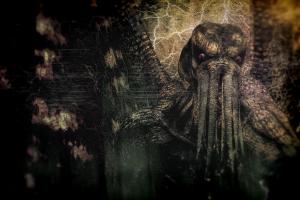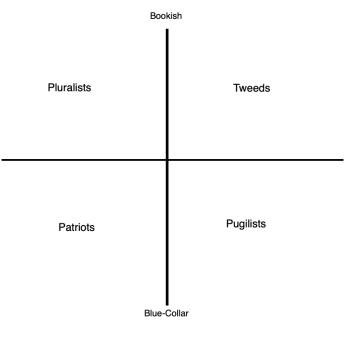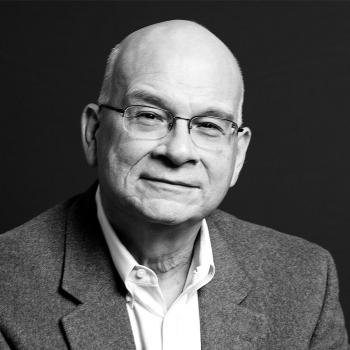 One of the more significant influences on pop culture over the last decade or so has been H.P. Lovecraft (1890–1937), a once-obscure writer of pulp fiction who’s lately enjoyed something of a revival. And I tend to think the reasons for his increased prominence have a good deal to do with the contemporary philosophical-theological zeitgeist.
One of the more significant influences on pop culture over the last decade or so has been H.P. Lovecraft (1890–1937), a once-obscure writer of pulp fiction who’s lately enjoyed something of a revival. And I tend to think the reasons for his increased prominence have a good deal to do with the contemporary philosophical-theological zeitgeist.
Lovecraft is best known for creating the Cthulhu Mythos, an interconnected series of short stories blending science fiction, horror, and social commentary. The most famous such story tells of a group of unfortunate sailors’ discovery of R’lyeh, an ancient city in the remote Pacific Ocean, where they accidentally awaken a primordial creature:
The Thing cannot be described—there is no language for such abysms of shrieking and immemorial lunacy, such eldritch contradictions of all matter, force, and cosmic order. A mountain walked or stumbled. God! What wonder that across the earth a great architect went mad, and poor Wilcox raved with fever in that telepathic instant? The Thing of the idols, the green, sticky spawn of the stars, had awaked to claim his own. The stars were right again, and what an age-old cult had failed to do by design, a band of innocent sailors had done by accident. After vigintillions of years great Cthulhu was loose again, and ravening for delight.
Lovecraftian “cosmic horror” is built around the premise that the cosmos is utterly indifferent to human beings. But that’s not to say the cosmos is empty. Rather, the most powerful forces in reality are ancient, godlike beings of chaos—the Great Old Ones—whose intentions are inscrutable and who care nothing for humanity. These Great Old Ones cannot be comprehended within the frame of normal human experience: even momentary exposure to the Great Old Ones’ presence is enough to reduce a human consciousness to gibbering madness. As a rough guide, where tentacles, space, and insanity are involved in a given story, it’s safe to say there are Lovecraftian elements at work.
Lovecraft’s footprint is all over contemporary entertainment—just off the top of my head, the 2004 film Hellboy, the first season of HBO’s True Detective television series, and Stephen King’s novel Revival all lean heavily into Lovecraftian themes. (Even Arkham Asylum—the facility famously housing Batman’s rogues’ gallery—takes its name from Lovecraft’s fictional town of Arkham, Massachusetts.) I doubt, however, most Lovecraft fans can quite articulate why they find his ideas so compelling and unsettling.
The reason, I think, is surprisingly straightforward: it’s difficult to find a writer who rejects the premises of the liberal-democratic order so thoroughly (and, more broadly, the premises of the Western theological tradition). In doing so, Lovecraft’s work powerfully captures the great fears of the modern age.
Lovecraft’s tales of cosmic horror reflect a metaphysical picture wholly alien to Christianity. Other stories like Dracula, The Exorcist, or even Event Horizon emerge from a distinctly Christian milieu. The forces of evil in those stories are understood to be evil by virtue of what they oppose: Dracula sets himself up over against God, a demon seeks to claim the soul of an innocent girl, and an ancient power of evil defiles the image of God in man. That is to say, there is a distinct moral duality at work in these tales and others like them—one that allows the descriptor “good versus evil” to be properly applied to them. The heroes are on God’s side, and the villains are on the devil’s.
But that is not how Lovecraft’s tales proceed. “Evil” is an unintelligible concept in Lovecraft’s literary world, because there is no transcendent ideal against which “evil” might define itself. There is no good or evil, only comprehensible or incomprehensible power. Indeed, the very essence of the Great Old Ones is near-absolute coercive authority that feels no need to justify or legitimate itself. They will do what they will do, and be what they will be, regardless of what human beings might think. There is nothing democratic or deliberative about these power relations; Lovecraft’s cosmos is ruthlessly, relentlessly hierarchical—and the human species is at the bottom of the ladder. The primary objective of any human character in a Lovecraft story is simple: escape!
The increasing popularity of Lovecraftian horror, I think, tracks (at least in part) a broader cultural shift away from the good/evil conceptual duality. In Lovecraft’s pitiless world, the traditional “good/evil” dyad is replaced by the dyad “freedom/oppression”—as it has in much contemporary discourse.
Of course, no discussion of Lovecraft would be complete without acknowledging his virulent racism—most prominently displayed in The Shadow Over Innsmouth, an anti-miscegenation parable. I’ve long believed that that which a culture treats as horror reflects its deepest fears and concerns, and Lovecraft’s work is certainly a fine example of that which contemporary liberal culture treats as maximally hateful—apologia for naked racial animus. (Matt Ruff’s recent novel Lovecraft Country confronts this head-on.) As race becomes an increasingly salient issue in the public square, Lovecraft’s work surely becomes increasingly disturbing. And this is consistent with Lovecraft’s broader grounding of horror in the fact of absolute, unjustified power: racial oppression, after all, involves the use of coercive power against individuals on the basis of some arbitrary characteristic, without regard for the morality or immorality of their actions.
One can press this line of argument still further and note that Lovecraft himself—a longtime resident of New England—could never rid his work of a certain hyper-Calvinist influence. There have long been strains of Reformed theology—albeit not the mainstream—that deny any analogous relationship between divine and human goodness (that is, when the Bible speaks of God loving all humans, God’s “love” for those predestined to damnation is actually hatred).
But a world in which God can only be conceived as pure, voluntarist Will without limit or moral constraint—albeit an omnipotent Will—is a world difficult to distinguish from Lovecraft’s world of Great Old Ones. Indeed, in his descriptions of encounter with the Great Old Ones, Lovecraft subverts the traditional Christian affirmation of the Beatific Vision—that is, the final moment where human beings behold God in His glory at the end of time. For Lovecraft, encounter with the “divine” can only be grasped as an encounter with terrifying, crazed, unfathomable power utterly alien to our experience. This is the only way Lovecraft can characterize a “divinity” that bears no relationship, even an analogous relationship, to what we identify as good.
And so we arrive at the crux of the matter: what the modern person truly fears, more deeply than even they can often articulate, is absolute unjustified power that demands subordination. Lovecraft’s Cthulhu, in short, is Hobbes’s Leviathan. The unfolding “metacrisis of liberalism” (to steal a term from John Milbank) is an outgrowth of this fear, which Lovecraft’s work powerfully exemplifies. The question now facing the West is a very old one: what is the basis of legitimate authority?
As a Christian, I would argue that the legitimation of power (in the very deepest sense) begins with the fundamental ontological hierarchy inscribed into the very fabric of creation: the infinite God calls into being the order of finite things. This foundational hierarchy can never be transcended, try though we might. But the Lutheran tradition goes a step further: God’s power is revealed in the death of Jesus on the cross and His subsequent resurrection—not through explosive demonstrations of sovereign will that shatter human categories. And in the cross, the categories of power relations are accordingly subverted: the truest and best leader is the one who voluntarily dies for his people. Power, in short, manifests as love.
Lovecraft has no concept of such a “unity of the transcendentals”—that is, the idea that God’s creative act can also be an outpouring of love, and also a manifestation of beauty, and so forth. For Lovecraft, power (in whatever guise) is abjectly amoral and the stuff of primal dread. But it need not be so—and in the philosophical-theological tradition, it has not always been so.
The answer to the metacrisis of liberalism, it seems to me, must lie in a better account of power. Exactly what that account looks like remains to be developed (integralism, as I’ve discussed at length elsewhere, does not strike me as a satisfactory answer). But I have little doubt that, sooner than we think, a theoretical way beyond R’lyeh will emerge into view.











